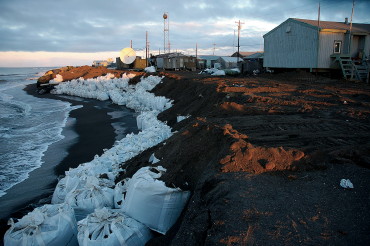The first national relocation plan is being developed on the atoll island nation of Kiribati.
From the Huffington Post:
Kiribati President Anote Tong told The Associated Press on Friday that his Cabinet this week endorsed a plan to buy nearly 6,000 acres on Fiji’s main island, Viti Levu. He said the fertile land, being sold by a church group for about $9.6 million, could be insurance for Kiribati’s entire population of 103,000, though he hopes it will never be necessary for everyone to leave.
“We would hope not to put everyone on one piece of land, but if it became absolutely necessary, yes, we could do it,” Tong said. “It wouldn’t be for me, personally, but would apply more to a younger generation. For them, moving won’t be a matter of choice. It’s basically going to be a matter of survival.”
Kiribati, which straddles the equator near the international date line, has found itself at the leading edge of the debate on climate change because many of its atolls rise just a few feet above sea level…..Tong has been considering other unusual options to combat climate change, including shoring up some Kiribati islands with sea walls and even building a floating island. He said this week that the latter option would likely prove too expensive, but that he hopes reinforcing some islands will ensure that Kiribati continues to exist in some form even in a worst-case scenario.
“We’re trying to secure the future of our people,” he said. “The international community needs to be addressing this problem more.”
President Tong has been one of the more forward thinking and acting leaders on this subject along with Mohammed Nasheed.
This issue calls into question what will happen to the national identity of the people of Kiribati – their culture, myths and belief systems about how they came to live on this atoll are all under threat from actions that they themselves had little to do.
Even this option is not a perfect solution, as Fiji itself will be vulnerable to sea level rise in the coming decades as well.
An issue the industrialized countries will soon have to face.

